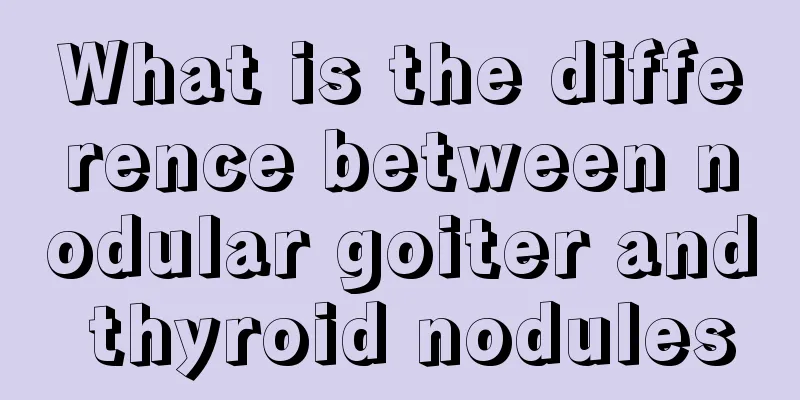What is the difference between nodular goiter and thyroid nodules

|
Generally speaking, most thyroid nodules are benign. They may occur alone or together with other diseases. Some have endocrine effects. Simple goiter is easier to diagnose. Generally speaking, the disease lasts for a long time and there are no other symptoms. The clinical manifestations are also normal. If you use drugs to treat the thyroid, you can shrink the nodules, but thyroid nodules can only be confirmed through accurate examinations. The patient had a long history of simple goiter. The age of onset is generally over 30 years old. There are more women than men. The degree of thyroid enlargement varies and is often asymmetric. The number and size of nodules vary, generally there are multiple nodules, and in the early stages there may be only one nodule. The nodules are soft or slightly hard, smooth and non-tender. Sometimes the boundaries of the nodules are unclear, and the surface of the thyroid gland only feels irregular or lobed when touched. The disease progresses slowly and most patients are asymptomatic. Larger nodular goiters may cause compressive symptoms, including difficulty breathing, dysphagia, and hoarseness. Acute bleeding into a nodule may cause a sudden increase in size and pain; symptoms may subside within a few days, and an enlarged mass may decrease in size over a few weeks or longer. When nodular goiter develops hyperthyroidism (Plummer's disease), the patient has symptoms such as fatigue, weight loss, palpitations, arrhythmia, heat intolerance, sweating, and irritability, but there is no local vascular murmur or tremor in the thyroid gland, exophthalmos is rare, and finger tremor is also rare. Symptoms in elderly patients are often atypical. Whether the patient has a history of radiation exposure, oral medication history and family history, whether the patient comes from an area where goiter is endemic, etc. Generally, nodular goiter has a long history, with no compression symptoms and no symptoms of hyperthyroidism. Most patients do not care about it and come for medical examination only when they accidentally discover thyroid nodules. If it is a hot nodule, also known as a toxic nodule, the patient is mostly over 40 to 50 years old, the nodule is of medium hardness, there are symptoms of hyperthyroidism, and even atrial fibrillation and other arrhythmias may occur. If there is bleeding, there may be pain or even fever. When the nodules are large, compression symptoms may occur, such as dysarthria, difficulty breathing, chest tightness, shortness of breath, and irritating cough. Finally, let me tell you what food is suitable for patients with nodular goiter. First of all, they should eat more foods high in iodine, such as kelp and seaweed, as well as some hair algae and scallops. Seafood is rich in iodine. There are also some foods that can disperse swelling, such as rapeseed, etc. Finally, you can also eat more foods that enhance immunity. |
<<: What can I eat every day to avoid constipation?
>>: What causes shoulder blade pain
Recommend
Can eating kiwi fruit cure oral ulcers quickly?
Oral ulcers are a relatively common manifestation...
What are the methods for treating thyroid enlargement
Sometimes we see that some people have thick neck...
How to exercise sexual function
A harmonious sex life can effectively improve the...
Experts teach you how to prevent osteosarcoma in daily life
Everyone is afraid when they hear the word "...
The chin is not cleanly shaved
Due to the influence of male hormones, men will g...
There is a pain in the thigh and buttocks
The thigh is connected to the buttocks by nerves....
How to solve itchy hair
Washing hair is a very common thing. Some people ...
Is it necessary to get the cervical cancer vaccine
It is necessary to get the cervical cancer vaccin...
What to do if you get a sore throat after drinking chrysanthemum tea
Chrysanthemum tea has high nutritional value and ...
How is prostate cancer caused? Check out the 4 causes of prostate cancer
Some friends found that they always had an unexpl...
Sudden weight loss! Beware of sub-health
Health doctors say that sub-health receives relat...
How to prevent uremia?
As we all know, uremia is a common kidney disease...
What is the difference between Maotai-flavor liquor and Luzhou-flavor liquor
Both Maotai-flavor liquor and Luzhou-flavor liquo...
What is the best way to treat nasopharyngeal carcinoma?
How to treat nasopharyngeal cancer? What are the ...
How to treat brain cancer in the early stage by yourself
Since the above situation is relatively simple an...









